2020 recipients
Twenty-three recipients have been awarded a Queensland Citizen Science Grant in the 2020 round, with more than $630,000 funding committed over three years to help increase Queenslanders’ participation in citizen science.
We are supporting a variety of citizen science projects from air quality monitoring to projects that study koalas and turtles. Funding has been awarded to six special projects that support protection of the Great Barrier Reef with local on-ground action, with one project in each of the natural resource management regions in the Great Barrier Reef World Heritage Area. Take a look at the list below of all citizen science projects funded in 2020.
-
 Burnett Koala Program
Burnett Koala ProgramBurnett Catchment Care Association Inc.
$29,600
The Burnett Koala Program is a citizen scientist-based project aimed at raising awareness regarding the significance of regional koala populations and habitat health, in addition to contributing to understanding koala distribution, presence, activity and habitat health in the Burnett catchment region.
The data gathered by citizen scientists will inform the protection and enhancement of crucial koala habitats, population diversity and recovery efforts. It will also draw on previous state data collection efforts in other regions and improve current population estimates for the Inland Burnett Region.
-
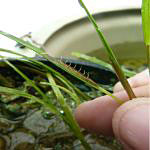 Sea Flowers: growing community engagement for seagrass restoration
Sea Flowers: growing community engagement for seagrass restorationCoastal Marine Ecosystems Research Centre, CQUniversity
$29,573
The Sea Flowers project will involve local people, voluntary organisations and apprenticeship schemes to become involved in the non-destructive collection of seagrass flowers from intertidal seagrass banks within Gladstone, Bundaberg and the Sunshine Coast.
The seagrass flowers will be used in seed storage, germination, viability and restoration by seed studies, while educating and promoting the value of these habitats to the local community.
-
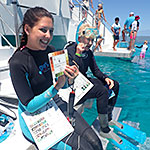 Coral Reef Keepers
Coral Reef KeepersLady Musgrave Experience
$30,000
There is very little known about the diversity of life at Lady Musgrave Island and lagoon on the Southern Great Barrier Reef. The Coral Reef Keepers project aims to train local citizen scientists in coral identification and collecting relevant reef health data.
The project will build on the local indigenous sea ranger's and Lady Musgrave Experience's already strong custodianship of the local reefs with the help and collaboration of school groups and the Bundaberg community of citizen scientists, the "Reef Keepers".
-
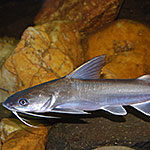 Using the Tinaroo fishing experience to promote citizen science and protect local fisheries
Using the Tinaroo fishing experience to promote citizen science and protect local fisheriesTablelands Regional Council
$26,500
The Tinaroo Fishing Experience project will involve competitors at the annual family fishing competition – the ‘Tinaroo Barra Bash’ – being asked to collect fork-tail catfish (originally from the gulf country) during the competition weekend.
Lake Tinaroo on the Atherton Tablelands is an important resource for tourism, recreation and agricultural purposes in our community. It feeds into the Barron River, a catchment of the Great Barrier Reef. The presence of this catfish may pose a biosecurity threat to the ecosystem. By raising awareness of local incursions of fish species we will promote dialogue regarding improvement of habitats and types of fish in the area.
-
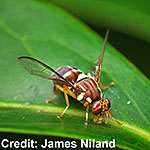 Residential Fruit Fly in the Bowen Gumlu Region
Residential Fruit Fly in the Bowen Gumlu RegionBowen Gumlu Growers Association Inc.
$13,420
The Residential Fruit Fly in the Bowen Gumlu Region project will involve community groups in the region using fruit fly traps to collect, count and report on the location and habitats of the fruit fly.
A map of problematic areas within the residential region will be produced to help future management of the fruit fly, including the reduction of pesticides and subsequent effects on the water quality of the Great Barrier Reef.
-
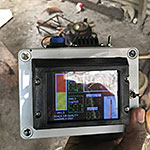 “The Air is Fair, Here and There”: Queensland communities assessing and comparing air quality
“The Air is Fair, Here and There”: Queensland communities assessing and comparing air qualityQueensland University of Technology (QUT)
$29,900
As part of The Air is Fair, Here and There project, user-friendly technology (‘KOALAs’) will be used by citizen scientists to monitor air quality. These KOALAs will monitor two key combustion and health-related air pollutants: fine particulate matter and carbon monoxide various towns across the state.
Monitoring and managing air quality will help protect healthy lifestyles and the wellbeing of our most vulnerable groups, including children and those suffering from asthma.
-
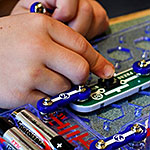 Study Fresh: Measuring and motivating healthier indoor air quality in classrooms
Study Fresh: Measuring and motivating healthier indoor air quality in classrooms The University of Queensland
$26,552
The Study Fresh project seeks to improve the capacity of Queensland students to thrive at school by gathering data on the indoor air quality of classrooms.
Using simple micro-electronics kits handed out to schools, students become citizen scientists recording, reading and uploading their air quality data, while learning valuable skills in simple electronics. Research finds negative effects on student performance can be avoided or reversed simply by ensuring adequate ventilation in classrooms. This project will help improve knowledge about classroom ventilation.
-
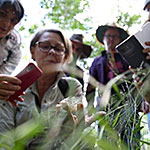 Biodiversity BioQuest of the urban-rainforest interface in Far North Queensland
Biodiversity BioQuest of the urban-rainforest interface in Far North QueenslandEarth Guardians Pty Ltd
$28,950
The Biodiversity BioQuest project in Far North Queensland will involve the engagement and education of residents living adjacent to rainforest edge, as well as any other interested Cairns residents, followed by three months of focussed biodiversity data collection by the residents using the QuestaGame app.
The QuestaGame data (sightings) collected from focus areas along the urban-rainforest interface will be classified by age of residential development. Data will also be collected adjacent to newly cleared areas and along public walking trails within protected rainforest. BioQuests are competitions that encourage data collection within a defined region. The BioQuest will enable collection data from these specific focus areas to understand the region’s biodiversity.
-
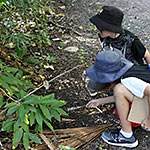 Parasites in the Wild
Parasites in the WildCentral Queensland University
$26,134
The Parasites in the Wild project aims to introduce children to a range of STEAM (Science, Technology, Engineering, Arts and Maths) principles and approaches through parasitology-related activities, using a citizen science approach. It will engage primary school-aged children participating in the Central Highlands Science Centre’s after school Science Club program, as well as members of the broader community.
Participants will be guided to develop a project plan addressing a hypothesis through the scientific method, collect and identify ticks using field and laboratory equipment and easy-to-understand identification keys, and design and build laboratory and field equipment, including tick traps.
Email Saba Sinai: s.sinai-mameghany@cqu.edu.au
-
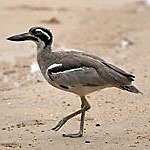 Beach-nesting Birds Pilot Study
Beach-nesting Birds Pilot StudyBirdLife Australia Ltd.
$29,200
The Beach-nesting Birds Pilot Study project will engage citizen scientists to monitor the distribution of beach-nesting birds in southern Queensland, conduct assessments of local threats to breeding beach-nesting birds and determine the feasibility of management actions and the establishment of a long-term monitoring program.
Currently there is no wide scale understanding of the impact of recreational beach use in southern Queensland, and it is unclear where management and threat mitigation action would be the most productive to markedly improve breeding success for populations of these species.
-
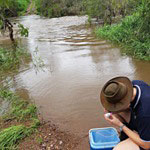 Sarina Catchment Waterwatch
Sarina Catchment WaterwatchSarina Landcare Catchment Management Association Inc.
$30,000
The Sarina Catchment Waterwatch project will work with citizen scientists to monitor water quality from four freshwater creeks within the Sarina Catchment: Plane Creek, Rocky Dam Creek and Carmila Creek and Basin Creek.
Citizen scientists will determine if ambient water quality is changing or has changed over time by conducting monthly, in-situ monitoring and comparing the results to baseline samples collected for laboratory analysis.
-
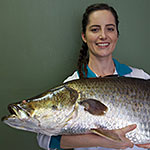 Extending Queensland REDMAP
Extending Queensland REDMAPJames Cook University
$30,000
The Extending Queensland REDMAP (Range Extension Database and Mapping) project aims to build our understanding of Queensland marine ecosystems (including the Great Barrier Reef) and how it is changing, with the help of Queensland fishers, divers, boaters and tourists.
Each year, 650,000 Queenslanders fish for recreation, and there are on average 1.2 million dive trips and 2.3 million snorkelling trips. Fishers and divers/snorkelers commonly take photos of their sightings or catch. The project will reach as many of these citizen scientists as possible and engage them to log these photos to the REDMAP mobile phone application or website.
-
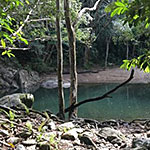 Treeforce Freshwater Creek Restoration and Citizen Science Project Stage 2, 2020 to 2023
Treeforce Freshwater Creek Restoration and Citizen Science Project Stage 2, 2020 to 2023Treeforce Association Inc
$29,888
The Treeforce Freshwater Creek Restoration and Citizen Science Project will involve citizen science sessions to collect data on all aspects of Freshwater Creek and surrounds.
The aim of the project is to increase the scientific knowledge of Freshwater Creek and engage the community in hands-on citizen science events by introducing tailored events to collect and analyse existing and new flora, fauna and historical data.
-
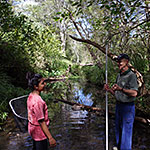 Moggill Creek Health Monitoring Project
Moggill Creek Health Monitoring ProjectMoggill Creek Catchment Group
$30,000
The Moggill Creek Health Monitoring Project will work with citizen scientists to monitor creek health through fish surveys, aquatic macro-invertebrate surveys, water quality measurements, observing creek bed and bank conditions, riparian vegetation condition, invasive aquatic weeds as well as litter collection and analysis.
The main objectives of the project are to understand how creek health varies across sites in Moggill Creek and its tributaries and identify trends and/or changes in creek health, to provide early warning of changes that might threaten these ecosystems.
-
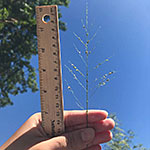 AusPollen Grass Gazers: citizen scientists tracking grass diversity and flowering times
AusPollen Grass Gazers: citizen scientists tracking grass diversity and flowering timesThe Queensland University of Technology - Allergy Research Group
$29,999
The AusPollen Grass Gazers project will encourage citizen scientists to describe and monitor allergenic pollen producing grass species, occurrence and flowering patterns around the Brisbane area, to help validate QUT’s daily grass pollen counting and forecasting.
Nearly 20% of Australians are estimated to suffer from hayfever which can adversely impact their health and quality of life and it poses a risk of triggering asthma attacks. Pollen is one of the major allergens to cause hayfever with grass being the most common allergenic pollen producer in Australia.
-
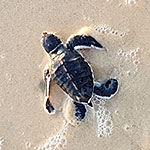 TurtleCare: Citizen Scientists Monitoring Marine Turtle Breeding on the Cooloola Coast
TurtleCare: Citizen Scientists Monitoring Marine Turtle Breeding on the Cooloola CoastCooloola Coastcare Association Inc
$30,000
The TurtleCare project will engage citizen scientists to collect data about threatened green turtle and endangered loggerhead turtle nesting. The project will also involve building a hatchery for relocation of nests at risk from tide inundation, collapsing beach cliffs and 4WD traffic.
Cooloola Coastcare will recruit, train and organise local citizen scientists and visiting tourists to conduct a 3 week turtle survey on two beaches (Rainbow Beach 2020 -21 and Teewah 2021-2) in the peak laying and hatching period in December.
-
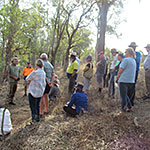 Citizen science to monitor and assess biodiversity on private lands within a regionally significant habitat corridor
Citizen science to monitor and assess biodiversity on private lands within a regionally significant habitat corridorTurner Charitable Co. Pty Ltd as Trustee for Turner Environmental and Education Trust
$28,500
This biodiversity project aims to increase community engagement in citizen science to improve knowledge of biodiversity and management of threatening processes in a regionally significant habitat corridor, the Little Liverpool Range.
The Little Liverpool Range provides a corridor of remnant vegetation linking Main Range National Park to the D’Aguilar Ranges, providing habitat to a variety of threatened species and ecological communities.
-
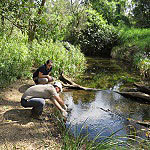 Platypus Watch and DNA in the Dawson River - Community Surveys and DNA sampling to document platypus populations in western Queensland
Platypus Watch and DNA in the Dawson River - Community Surveys and DNA sampling to document platypus populations in western QueenslandWildlife Preservation Society of Queensland
$26,930
This platypus project will combine community based observation surveys (with necessary training) and environmental DNA (eDNA) surveys to document the population distribution of platypuses within the upper Dawson River and tributaries around the Taroom Region.
Platypus are a cryptic species which makes population and distribution information difficult to confirm. This project will develop a best practice platypus survey project for the Dawson River to discover baseline population distribution.
-
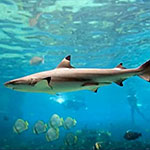 Shark'd - A Citizen Science Approach to Understanding Shark Depredation
Shark'd - A Citizen Science Approach to Understanding Shark Depredation Infofish Australia
$29,600
The Shark'd project will take a citizen science driven approach to address the issue of shark depredation (when sharks take fishers’ catch). This project will provide the fishing community with better tools to manage their fishing activity and to reduce encounters which provide risks to fish and fishers.
Shark depredation is a growing area of concern for both conservation organisations concerned with the status of sharks, as recreational and commercial fishers anecdotally are reporting an increase in interactions with sharks.
-
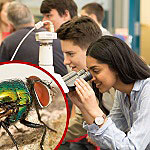 Maggot Menageries: Do-It-Yourself laboratories for the production of medicinal maggots in conflict-affected communities
Maggot Menageries: Do-It-Yourself laboratories for the production of medicinal maggots in conflict-affected communitiesDr Frank Stadler, MedMagLabs, School of Medicine, Griffith University
$9,061
The Maggot Menageries project will involve citizen scientists creating DIY maggot laboratories which can be replicated in military conflict regions where medical aid is hard to reach. The efforts of Year 9-10 student citizen scientists from four Queensland high schools (Isis District State High School, Nanango State High School, Roma State College, and Thuringowah State High School) will inform the development of online multi-lingual and illustrated DIY-lab instructions and training resources.
Medicinal maggots are used in maggot therapy: the treatment of wounds with living fly larvae to remove dead tissue, to control infection, and to promote wound healing. This project has real-life impact, and participating citizen scientists will help contribute to saving limbs and lives in conflict and war.
The team have created a Quick guide to citizen science with school students , which includes a snapshot of the Maggot Menageries project and some recommendations for researchers and teachers who want to begin a citizen science project.
To find out about medicinal maggot production, email info@medmaglabs.com
-
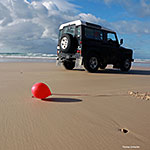 More effective ways to tackle the beach litter crisis: a surf live saving club leads the way
More effective ways to tackle the beach litter crisis: a surf live saving club leads the wayUSC - University of the Sunshine Coast
$30,000
Queensland’s sandy beaches are irreplaceable natural assets: our beaches underpin local economies and provide irreplaceable habitat for iconic wildlife species. These outstanding values are threatened by man-made debris. In this unique project we will tackle the beach litter crisis in a novel way, empowering citizen scientists to improve the health of Queensland’s outstanding beaches.
Beach litter is washed up from the sea at irregular rates. It also accumulates not evenly along the coastline. Citizen scientists will collect and analyse input rates and distributions of litter – these invaluable data form the core of models to identify the best ways to remove most beach litter most efficiently.
-
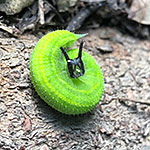 Woodfordia’s BioDiscovery Project
Woodfordia’s BioDiscovery Project Woodfordia Inc.
$29,939
Woodfordia’s BioDiscovery Project examines citizen science as an effective tool in biodiversity research studies, using ~500 acre site of Woodfordia, the home of the Woodford Folk Festival and The Planting.
Woodfordia is home to a significant biodiversity of wildlife. Citizen scientists will survey the site’s biodiversity over a year through camera trapping, foliage disturbance sampling, photography, aquatic netting, spot lighting, sound recordings, scat and burrow detection and microscopy.
-
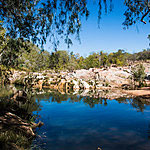 Drop in the Bucket: Citizen Scientists Delivering Water Monitoring for the Northern Gulf Region
Drop in the Bucket: Citizen Scientists Delivering Water Monitoring for the Northern Gulf RegionNorthern Gulf Resource Management Group
$29,270
The Drop in the Bucket project provides important water quality and ecosystem health data for rivers in the Northern Gulf Region. Citizen scientists will use observational methods to provide ongoing health assessment for the river system.
The Northern Gulf Region is undergoing intensive agricultural development that will lead to changes in water use, vegetation management and land development. This project will provide early warning to any degradation which might be brought on by these changes, and guide management of the river system.
Did you know that anyone can be a citizen scientist?
Check out this video to learn about citizen science and all the types of scientific projects you can help in Queensland.